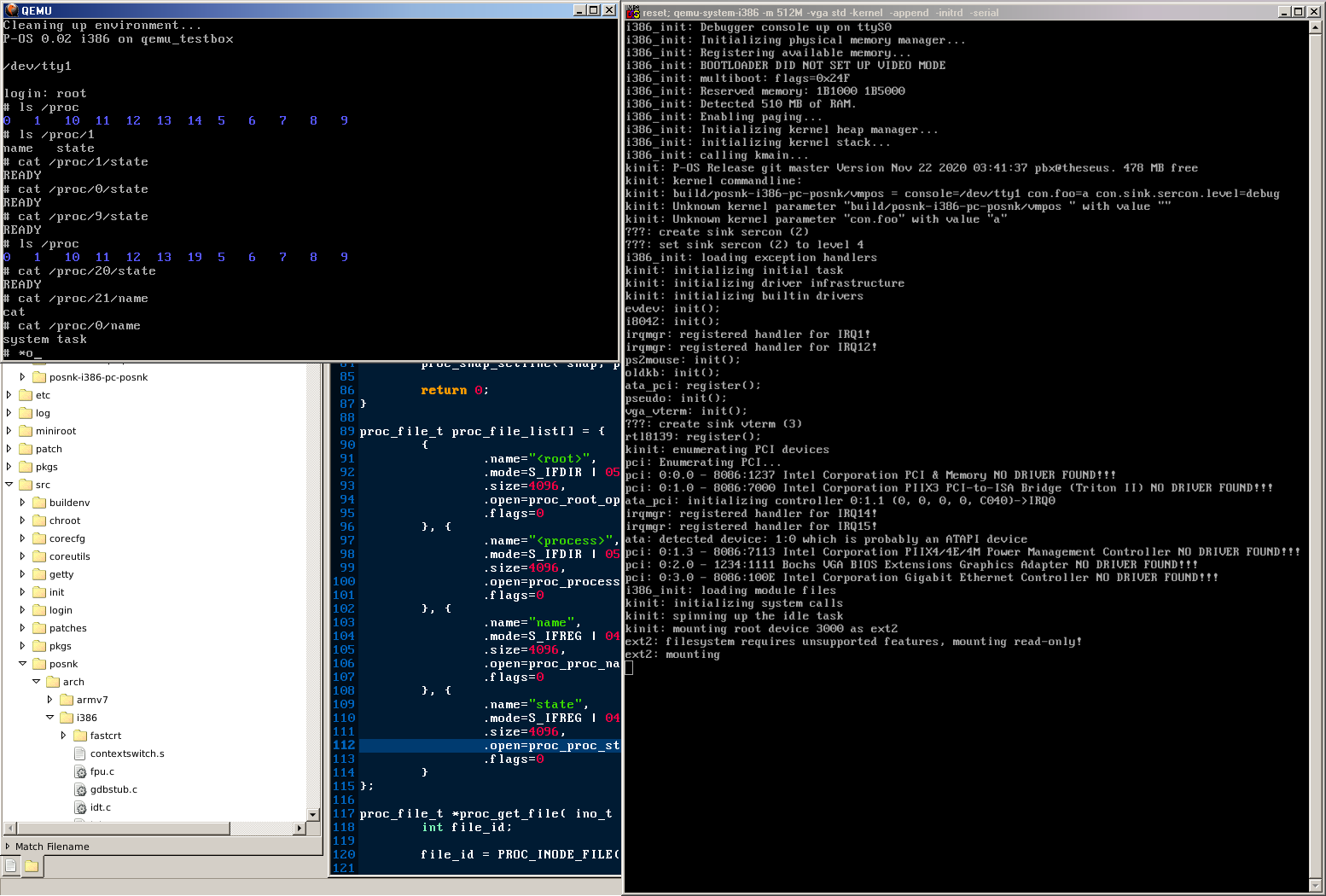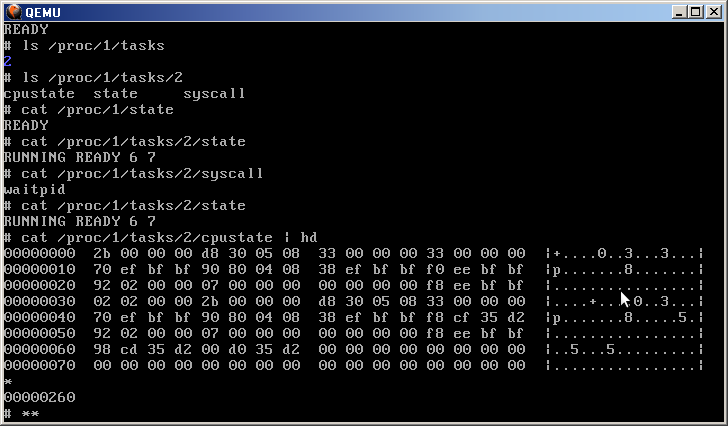
What does your OS look like? (Screen Shots..)
-
Peterbjornx
- Member

- Posts: 116
- Joined: Thu May 06, 2010 4:34 am
- Libera.chat IRC: peterbjornx
- Location: Leiden, The Netherlands
- Contact:
Re: What does your OS look like? (Screen Shots..)
Finally got a framework for pseudofilesystems working, started work on an implementation of procfs using it. Upto this point, there was no way for a process running on my kernel to know about other processes (except for maybe something like kill()'s status return or waitpid())


Re: What does your OS look like? (Screen Shots..)
Looks really good. But the link in your signature isn't working.
Greetings
Peter
Greetings
Peter
- araxestroy
- Member

- Posts: 560
- Joined: Wed Jul 13, 2011 7:38 pm
- Libera.chat IRC: araxestroy
- Location: Vancouver, Canada
- Contact:
Re: What does your OS look like? (Screen Shots..)
Nothing terribly exciting out of this neck of the woods. Runtime configuration is coming together, as can be seen here:

Meanwhile I'm also working on laying out some documentation once again for compilation into a book to go along with the system:

Click for big.

Meanwhile I'm also working on laying out some documentation once again for compilation into a book to go along with the system:

Click for big.
-
Peterbjornx
- Member

- Posts: 116
- Joined: Thu May 06, 2010 4:34 am
- Libera.chat IRC: peterbjornx
- Location: Leiden, The Netherlands
- Contact:
Re: What does your OS look like? (Screen Shots..)
Hmm. I need to fix that, https://github.com/posnk/posnk/ is the kernel.PeterX wrote:Looks really good. But the link in your signature isn't working.
Also, getting pretty close to being able to implement an userland debugger in my OS

Re: What does your OS look like? (Screen Shots..)
Do you have any pre-built release downloads?Peterbjornx wrote:Hmm. I need to fix that, https://github.com/posnk/posnk/ is the kernel.PeterX wrote:Looks really good. But the link in your signature isn't working.
-
Peterbjornx
- Member

- Posts: 116
- Joined: Thu May 06, 2010 4:34 am
- Libera.chat IRC: peterbjornx
- Location: Leiden, The Netherlands
- Contact:
Re: What does your OS look like? (Screen Shots..)
Not any good ones, at the moment, unfortunately. Things are still somewhat broken after some major kernel refactoring. (i started the project back in '14 when i was still in high school, needless to say, i've learnt a lot since then.)klange wrote:Do you have any pre-built release downloads?Peterbjornx wrote:Hmm. I need to fix that, https://github.com/posnk/posnk/ is the kernel.PeterX wrote:Looks really good. But the link in your signature isn't working.
My testing at the moment uses a pretty barebones rootfs, and I also haven't yet added a lot of the new features to my busybox port.
I'll throw together a quick image without a gui or VIM. Don't have a bootloader setup script handy so you'll have to use "-kernel" on qemu.
-
Peterbjornx
- Member

- Posts: 116
- Joined: Thu May 06, 2010 4:34 am
- Libera.chat IRC: peterbjornx
- Location: Leiden, The Netherlands
- Contact:
Re: What does your OS look like? (Screen Shots..)
To run using ATA harddrive (RW root):Peterbjornx wrote:I'll throw together a quick image without a gui or VIM. Don't have a bootloader setup script handy so you'll have to use "-kernel" on qemu.
Code: Select all
qemu-system-i386 -m 512M -vga std -kernel vmpos -append "= console=/dev/tty1 root=1000 con.sink.sercon.level=debug" -hda demoroot.img -serial stdio -s -enable-kvmCode: Select all
qemu-system-i386 -m 512M -vga std -kernel vmpos -append "= console=/dev/tty1 con.sink.sercon.level=debug " -initrd demoroot.img -serial stdio -s -enable-kvmKernel: https://pbx.sh/upl/vmpos (<2M)
Root FS: https://pbx.sh/upl/demoroot.img (128M)
This is still a pretty damn unstable build, and one of the things on top of the To Do list is to add a UBSAN runtime and clear out some of the code rot.
I had signals working fully before I added multithreading to the kernel, they are somewhat buggy now.
If you want to debug some program, set the sercon level to trace, and you'll get a strace-like output from the serial console
Re: What does your OS look like? (Screen Shots..)
@Kazinsal: What's the .\\pipe\compipe in Putty's title? If that's a way for Putty to connect to a VM's serial port, I'm super-interested! 
I might go for asymmetric multiprocessing myself.
I might go for asymmetric multiprocessing myself.
Kaph — a modular OS intended to be easy and fun to administer and code for.
"May wisdom, fun, and the greater good shine forth in all your work." — Leo Brodie
"May wisdom, fun, and the greater good shine forth in all your work." — Leo Brodie
- araxestroy
- Member

- Posts: 560
- Joined: Wed Jul 13, 2011 7:38 pm
- Libera.chat IRC: araxestroy
- Location: Vancouver, Canada
- Contact:
Re: What does your OS look like? (Screen Shots..)
\\.\pipe\ is the NT namespace for named pipes, and PuTTY can open named pipes as serial ports like so:eekee wrote:@Kazinsal: What's the \\.\pipe\compipe in Putty's title? If that's a way for Putty to connect to a VM's serial port, I'm super-interested!
I might go for asymmetric multiprocessing myself.

On the VirtualBox side, it's configured like this:

Make sure to uncheck "Connect to existing pipe/socket" so VirtualBox creates the named pipe when the VM starts and closes it when it stops. It'll keep it open if the OS restarts the VM or if you "hard reset" it, so you won't lose any scrollback on a restart. I use it when testing changes, as I can build a new ISO, tab back over to PuTTY, type "reload" into my console, and then once it finishes rebooting I can run my test and scroll up to compare output.
Re: What does your OS look like? (Screen Shots..)
@Kazinsal: Thanks! I was hoping NT had something like this.
Kaph — a modular OS intended to be easy and fun to administer and code for.
"May wisdom, fun, and the greater good shine forth in all your work." — Leo Brodie
"May wisdom, fun, and the greater good shine forth in all your work." — Leo Brodie
-
astralorchid
- Posts: 6
- Joined: Sun Nov 29, 2020 10:24 pm
Re: What does your OS look like? (Screen Shots..)
@astralorchid: Is that 3 programs? (terminal, test, and shell?) Whether it is or it isn't, it looks like you're getting somewhere. 
Kaph — a modular OS intended to be easy and fun to administer and code for.
"May wisdom, fun, and the greater good shine forth in all your work." — Leo Brodie
"May wisdom, fun, and the greater good shine forth in all your work." — Leo Brodie
-
astralorchid
- Posts: 6
- Joined: Sun Nov 29, 2020 10:24 pm
Re: What does your OS look like? (Screen Shots..)
the terminal is the shell and loads like a program, but it's a bit more connected to the kernel.eekee wrote:@astralorchid: Is that 3 programs? (terminal, test, and shell?) Whether it is or it isn't, it looks like you're getting somewhere.
I also took Terry's advice and looked into INT 0x13/AH 0x42. Now the OS is booting on everything from an old 32bit BIOS to a UEFI with CSM from this year.
Re: What does your OS look like? (Screen Shots..)
That's fair enough. I'm not keen on normal terminals anyway.astralorchid wrote:the terminal is the shell and loads like a program, but it's a bit more connected to the kernel.eekee wrote:@astralorchid: Is that 3 programs? (terminal, test, and shell?) Whether it is or it isn't, it looks like you're getting somewhere.
Cool.astralorchid wrote:I also took Terry's advice and looked into INT 0x13/AH 0x42. Now the OS is booting on everything from an old 32bit BIOS to a UEFI with CSM from this year.
Kaph — a modular OS intended to be easy and fun to administer and code for.
"May wisdom, fun, and the greater good shine forth in all your work." — Leo Brodie
"May wisdom, fun, and the greater good shine forth in all your work." — Leo Brodie
Re: What does your OS look like? (Screen Shots..)
New progress:
- Debugger is now accessible from very early on during booting, using text mode
- Many debugger improvements
- Drivers are now dynamically loaded instead of being compiled into the kernel. Drivers for boot media are loaded using function provided by boot sector.
- Doesn't crash as much
- Can run more DOS programs
- Debugger is now accessible from very early on during booting, using text mode
- Many debugger improvements
- Drivers are now dynamically loaded instead of being compiled into the kernel. Drivers for boot media are loaded using function provided by boot sector.
- Doesn't crash as much
- Can run more DOS programs
